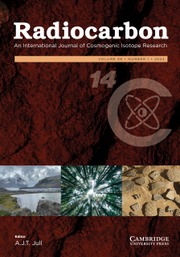Article contents
Historical Reconstruction of Submarine Earthquakes Using 210Pb, 137Cs, and 241Am Turbidite Chronology and Radiocarbon Reservoir Age Estimation off East Taiwan
Published online by Cambridge University Press: 21 January 2016
Abstract
Taiwan is a young and seismically active mountain belt, where a series of strong earthquakes (M>7) have occurred over the past hundred years. Identifying historical earthquakes around Taiwan is a key to better constrain the geodynamic of this active region. Sedimentological and geochemical analyses of surface sediments from one station offshore east Taiwan revealed the presence of coarse-grained layers interpreted as turbidites. The age of these layers have been determined by 210Pb, 137Cs, and 241Am chronology. Dating of the three most recent turbidites provides ages of AD 2001±3, AD 1950±5, and AD 1928±10. The results show striking temporal correspondence of turbidite layers to large (M≥6.8) earthquakes recorded in the region since the 20th century. The chronologies of sediment layers lead us to believe that turbidites resulted from the 2003 Taitung earthquake (M 6.8), the 1951 Chengkong earthquake (M 7.1), and the 1935 Lutao earthquake (M 7.0), respectively. Such a good correlation between turbidites and high-magnitude (M≥6.8) historical and instrumental seismic events suggests that turbidite paleoseismology constitutes a valuable tool for earthquake assessment in the eastern Taiwan margin. Moreover, the modern reservoir radiocarbon age and the regional marine reservoir correction (ΔR) of the Kuroshio Current off Taiwan were estimated by comparing accelerator mass spectrometry (AMS) 14C ages with ages derived from corrected 210Pb profiles and historical accounts of identifiable seismic events. Such a determination is important to calibrate the 14C ages of marine materials for accurate comparison of marine and continental geological records. Our calculated mean ΔR value of 232±54 14C yr (n=2) is higher than its modern value of 86±40 14C yr. This high value can be explained by the presence of local upwelling cells and turbulence in the Kuroshio Current, north of Green Island. These upwelling cells bring 14C-depleted water to the surface, resulting in an increase of the modern ΔR value in this portion of the Kuroshio Current.
- Type
- Research Article
- Information
- Copyright
- © 2016 by the Arizona Board of Regents on behalf of the University of Arizona
References
REFERENCES
- 10
- Cited by


